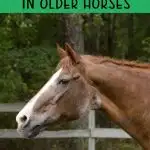As horses grow into their senior years, they often have a hard time maintaining their weight. There are a couple of different health issues that can contribute to weight loss in older horses. Thankfully, there are a number of ways to help your older horses gain back any weight they have lost and prevent additional weight loss in the future.
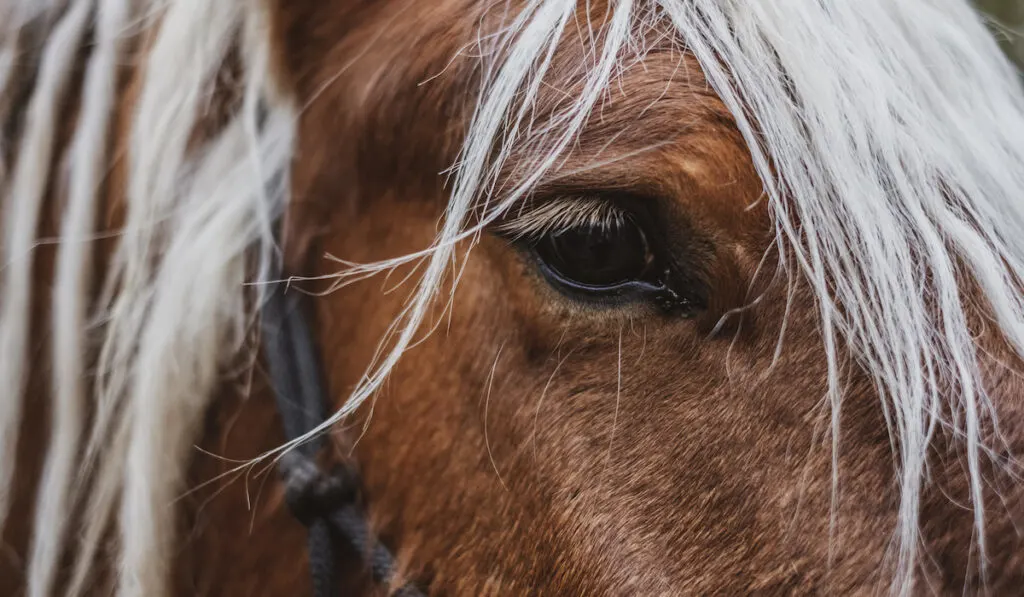
Dental problems and gastrointestinal decline can cause sudden weight loss in an older horse, even if they have been on the same diet successfully for years. With just a few small dental and dietary changes, you could have your older horse looking and feeling better in no time.
Just because your senior horse is losing weight, it does not mean that the end is near. According to a 2015 equine study by the United States Department of Agriculture, 11.4 percent of horses in the U.S. are age 20 years or older (source).
This percentage is twice as high as it was in 1998. With so more many senior horses in the country today, finding a solution for your horse is easier than you may think.
Equine Dental Care – The First Step for Weight Gain
The first thing that you should check when your senior horse begins losing weight is its teeth. As horses reach their golden years, they can, unfortunately, begin to lose some of their back teeth, their molars.
Most people just check the front teeth and assume that there aren’t any problems because they look fine. The trick is to check the teeth further back in their mouths.
These are the teeth that are responsible for grinding down their food. If a horse is having issues grinding their food properly, their digestive system will be unable to process the food efficiently.
The horses’ back teeth could also have sharp or rough edges and the pain could be preventing them from eating the same amount of food that they used to eat.
If, for example, your horse is on pasture only, you may think that it is eating enough food when in actuality, it is not. If you are unable to check your horse’s teeth yourself, you can have a vet examine them for you.
Your veterinarian will be able to tell you if there are any dental issues affecting your horse’s eating habits. If there are any issues that can be remedied, be sure to have them fixed as soon as possible. (source)
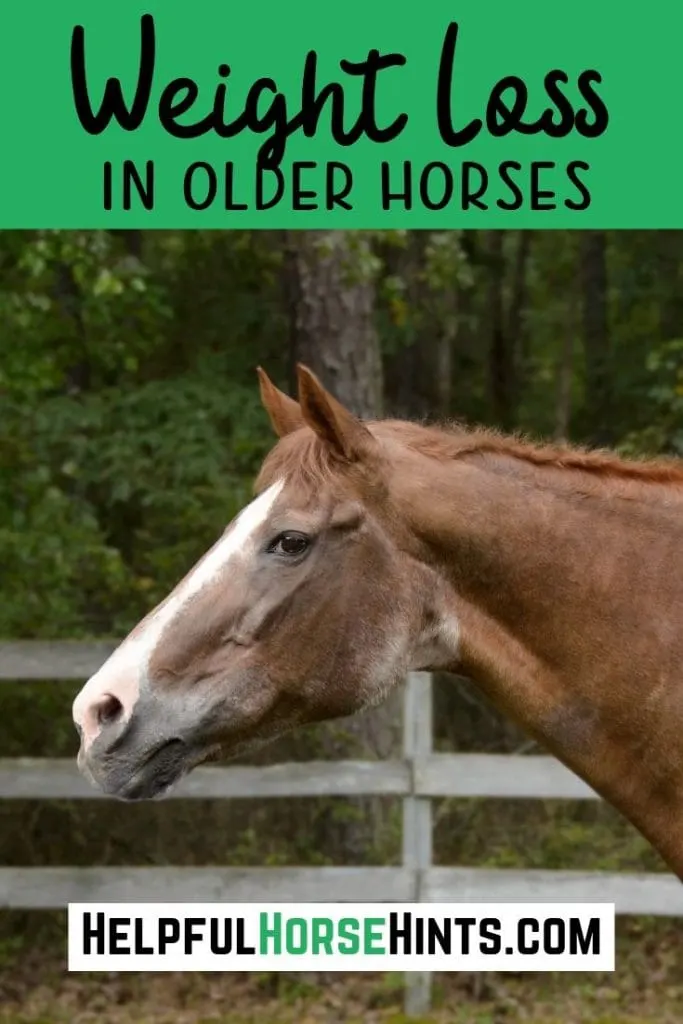
Equine Digestive Issues – How It Causes Geriatric Horses to be Underweight
Older horses can experience a decline in their ability to digest foods properly. It is a natural part of the aging process. As horses begin to move and exercise less as they age, their digestive systems can suffer.
Age can cause a horse to have issues digesting fiber which results in lowered intestinal function. Gradually, your horse may become unable to maintain their weight on the diet that they have been perfectly fine with for years.
If you have already checked their back teeth and they look fine, then your problem is likely digestive in nature. It is always recommended to have a vet examine your horse and even run a few tests to rule out any diseases or other illnesses. (source)
Encouraging Weight Gain with Expert Care, Diet, & Supplements
Whether the problem seems to be tooth loss or digestive issues, or even a combination of both, there are a variety of feeds and supplements made specifically for older horses.
These supplements are designed to help older horses gain weight and maintain their weight as they grow older. If your horse is not exhibiting any other signs of distress and you have been deworming them as needed, then the solution to your problem may be as simple as changing to a senior horse diet.
You should always have your horse checked for liver and kidney disorders before adding any higher fat foods to your horse’s diet. It never hurts to consult your vet before changing your horse’s diet as well. (source)
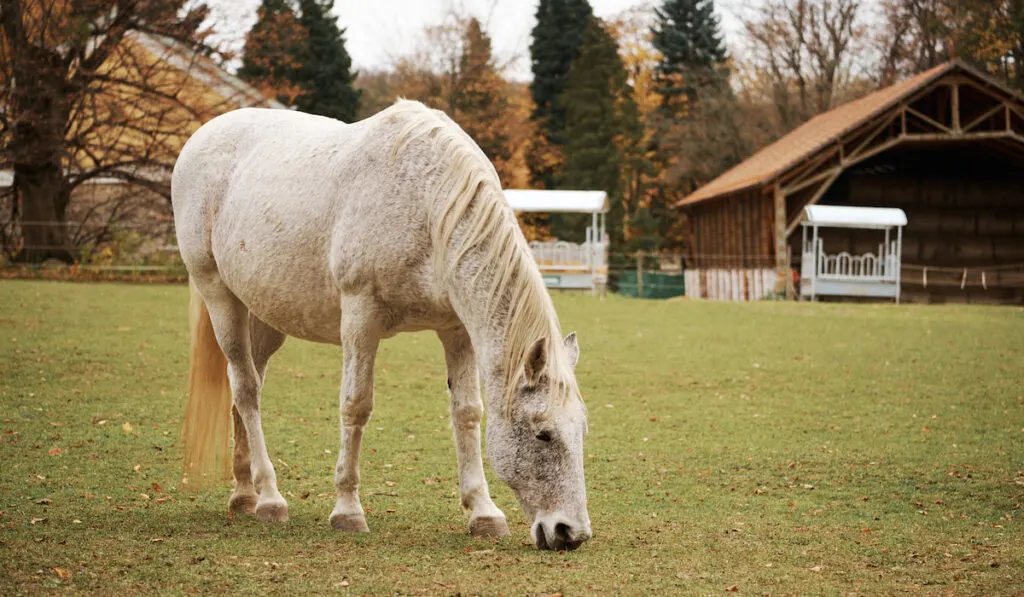
Complete Feeds
Horse owners that have older horses sometimes switch to using complete feeds formulated for senior horses. Horses need roughage on a daily basis to keep their digestive systems working properly.
A complete feed includes a roughage base with added grains or other energy sources. This provides the horse with roughage and an adequate supply of energy and vitamins. (source)
This type of feed can be fed along with hay or as the only feed in your horse’s diet. Triple Crown and Purina manufacture a couple of different kinds of senior complete feeds that may be the perfect choice for your older horse.
Many of these senior feeds are formulated in a way that makes them softer for horses to chew. They can even be soaked with water to make them even softer if necessary.
Chopped Forage for Horses Who Are Losing Weight
For many horses with dental problems, using chopped hay or other forage can be the solution you need. Providing a chopped forage helps lessen the amount of chewing needed when eating.
There are a variety of choices of chopped forages out there. Be careful when feeding alfalfa cubes to older horses, they may have trouble chewing them.
Soaking them beforehand is one option, the other would be to make the switch to chopped alfalfa. You can purchase chopped hay, alfalfa, or shredded beet pulp at most local feed stores.
Timothy hay is a high quality chopped hay that you can purchase as many feed suppliers. Shredded beet pulp is another form of high-quality forage that can be soaked before being fed. This helps senior horses chew and swallow the beet pulp more easily.
Standlee Hay Company sells a line of chopped alfalfa hay, chopped timothy mixed with alfalfa, and beet pulp shreds that are all perfect forage supplements for older horses.
Adding Supplements to the Older Horses Diet
Some senior horses may need a little more help than complete feeds and chopped forage can offer. Some horse owners prefer to add vegetable oil or rice bran to their horse’s feed to add calories, but these additives do not offer many nutrients beyond fat content.
Many equine feed companies sell multiple supplements created especially for older horses. These supplements often include high-fat content along with added vitamins that help older horses gain and maintain weight.
Most of these supplements are designed to be extra palatable for senior horses to help them chew and digest them easier. Mannipro has a supplement called Senior Weight Accelerator that has a high fat and calorie count, omega 3 fatty acids, and probiotics that aid in digestion.
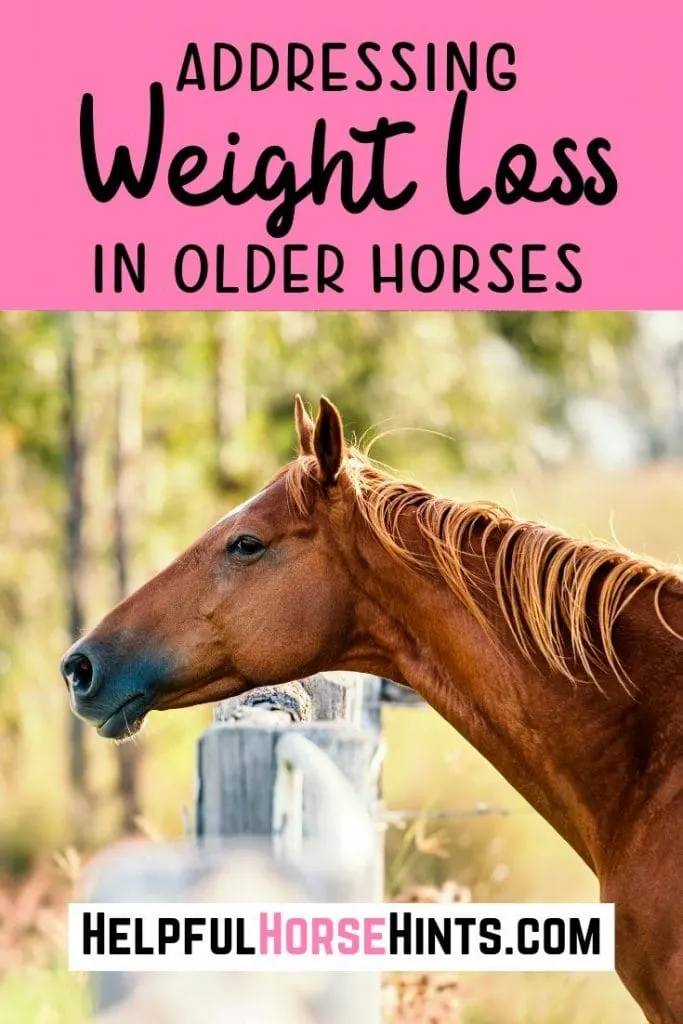
Feeding Your Older Horse More Often May Help Add Weight
Sometimes, the solution can be as simple as adding a meal to your seniors’ horse’s daily feeding schedule.
For some owners, this is not possible due to work schedules, but for others, this may be a valid way to help their older horse gain some weight.
If possible, try feeding 3 slightly smaller meals a day instead of two larger ones. This will keep the horse from waiting too long between meals and may help them put on weight without having to change their diet completely. (source)
Final Thoughts
As time goes on, it seems that there will be more and more horses living well into their senior years.
It is our responsibility as horse owners to provide them with adequate nutrition and help to keep them healthy as they grow older.
With a food and supplement market designed especially for senior horses, there is no doubt that you can keep your equine friend around longer than ever before.
Related Posts
- When is a Horse Too Old to Ride?
- Beet Pulp for Horses (it can help with weight gain)
- Average Lifespan of Horses and Ponies with Chart

